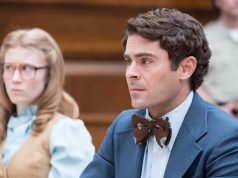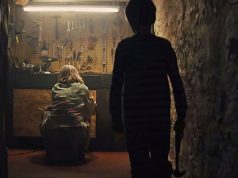It may have classier roots, but “Hannibal Rising” suffers from the same problem that doomed “The Texas Chainsaw Massacre: The Beginning.” Both prequels purport to show the ghastly psychological underpinnings of their respective killers — Hannibal Lecter here, Leatherface in the “Chainsaw” films — yet both are hamstrung by the fact that monsters like that are born, not made. Traumatic early-life experiences can only go so far, can only prove so much. Lots of people have horrible childhoods and still manage not to become flesh-eating serial killers.
There have been a few films that have accurately and effectively conveyed a character’s psychological transformation from good to evil, but “Hannibal Rising” is not one of them. Film is a visual medium, and it’s hard to demonstrate through outward action what is happening to someone inwardly. It’s even harder to show WHY it’s happening.
The reason Hannibal Lecter became the slithering psychopath of “Silence of the Lambs” and its companion stories is, of course, that novelist Thomas Harris willed him to do so. That is, Lecter was already fully grown and killing people when we first met him, in Harris’ 1981 novel “Red Dragon.” We have no reason to suspect that Harris had a backstory in mind at the time. Surely the subsequent explorations into Hannibal’s past have been afterthoughts.
“Hannibal Rising” smells of afterthought, among other things. Based once again on a Harris novel (and for the first time screenwritten by him, too), the film obviously was not made because Harris had a fantastic idea for a Hannibal Lecter origin story. It was made because someone backed a dumptruck full of money up to Harris’ house and said, “If we pour this money into your living room, do you think you can come up with something?” And Harris said, “Yes. Yes I can.”
What he came up with is that Lecter Castle in Lithuania was evacuated in 1944 as Russia-vs-Germany warfare tore the region apart, and li’l Hannibal (played at age 10-ish by Aaron Thomas) and his sister Mischa (Helena Lia Tachovska) were left to fend for themselves after their parents were killed. They’re stuck in an isolated cabin through the dead of winter, menaced by Russian mercenary soldiers who eventually commit an act that is unspeakable — almost literally so, as the movie knows that if anyone ever says it out loud, it will sound ludicrous and funny. (Someone finally does say it, much later, and sure enough: funny. That’s the nature of cannibalism, I suppose — creepy to think about, funny to talk about.)
Hannibal goes to an orphanage — conveniently located in what used to be his family’s castle, certain key heirlooms still intact!! — and grows up to become a handsome, snake-faced medical student played by Gaspard Ulliel. He lives with his hot, widowed, Japanese aunt, Lady Shikibu (Gong Li), and defends her honor by butchering a butcher who insulted her. The provenance of his people-eating predilection is obvious enough, but that’s only a start. Why is he smarter and more perceptive than everyone around him? How does he understand human nature so thoroughly? He must have been born with that kind of genius. So, tell me again: Why are we watching a movie that’s supposed to explain Hannibal Lecter if the only real explanation is that, well, he’s just always been like that?
It’s a case of bait-and-switch. It lures us in with a promise to uncover all of Hannibal’s psychological secrets, and then all it actually does is show him killing people — same as the other movies, only now he’s younger.
As far as movies about psycho killers go, and laying aside the expectations created by the film’s better predecessors, “Hannibal Rising” isn’t particularly bad. Peter Webber (“Girl with a Pearl Earring”) directs it as a gray, somber story, occasionally tense and not without its interesting passages. And while Ulliel is no Anthony Hopkins — well, who is? Ulliel is malevolent and articulate enough as Hannibal.
But the film can’t escape the weakness of Harris’ melodramatic screenplay. The point keeps being made that many people lost everything during the war — Hannibal, Lady Shikibu, even the French inspector Popil (Dominic West), a character the film includes with such halfheartedness that you wonder why they even bothered. So how come Hannibal’s the only one who got screwed up by it? Wasn’t the movie supposed to be explaining that?
Instead, the movie is busy doing stupid things like having Hannibal find an Eastern ceremonial mask that bears a striking resemblance to the famous one he’ll wear years later. He puts it on, and it’s supposed to feel like Batman putting on his cowl for the first time. But it doesn’t make any sense: When Hannibal wears that mask in “Silence of the Lambs,” it’s not an affectation; it’s a precaution set in place by the federal authorities to prevent him from EATING ANYONE WHILE BEING TRANSPORTED. If he’s getting his jollies from wearing it now, as a young man, are we to assume he likes it as an old man, too? Does he find the straitjacket comfortable as well? Good thing he chose a profession — incarcerated serial killer — that allows him to wear the costume he’d have chosen anyway!
To enjoy the film, you’ll need to disregard its Oscar-winning precursors, and especially forget the true psychological tension that “Manhunter” and “Silence” had. It’s gory, gruesome kill-for-thrills stuff, not unlike certain chainsaw-based shockers I could name. Hannibal might just as well be another garden-variety psycho, and maybe that’s enough to titillate some viewers.
C (1 hr., 57 min.; )





